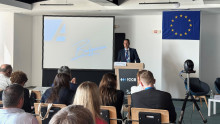We need to provide a ‘fast track’ and change the slow administrative procedures that stop almost all major infrastructure projects in transport. This was stated by the Minister of Transport and Communications Georgi Gvozdeykov at the Connectivity Forum 2024, which is held in Burgas.
In his words, Bulgaria is not further behind than other European countries in terms of construction, but there are not a few cases in which because of the completion of documents and permits there is a delay of several years, which is unacceptable, explained Gvozdeykov.
The second Danube bridge between Ruse and Giurgiu will be included in the main European transport network and the new priority corridor ‘Baltic Sea—Black Sea—Aegean Sea’, with an extension to Ukraine and Moldova, Georgi Gvozdeykov said. The corridor will provide a link between the three seas and develop combined freight and passenger transport flows. ‘In the context of the changed geopolitical situation, it is necessary to work actively together with Romania and Greece to improve the road and rail connectivity in the North-South direction, which will enable the fast and safe passage of the expected high volume of traffic. Our goal is also to connect the Greek ports on the Aegean Sea and the Bulgarian Black Sea ports by rail. This will provide an alternative to the Bosphorus route’, the minister added.
Georgi Gvozdeykov pointed out that transport connectivity is one of the most important elements of integration. In his words, Corridor 8 will play a significant role in connecting the Black and Adriatic Seas, with the port of Durres serving as a strategic link between the Italian ports on the Adriatic and the Bulgarian ports on the Black Sea.
With the help of EU funding, the priority is the completion of the modernisation of the Sofia-Plovdiv-Burgas railway line and the progress of the railway link between Bulgaria and North Macedonia, the transport minister said. Other major infrastructure projects along Corridor 8 are the completion of facilities on the Karnobat—Sindel railway line, as well as the construction of railway connections to the airports in Plovdiv and Burgas.
The Forum is organised by the Konrad Adenauer Foundation Bulgaria. The event was attended by H.E. Irene Maria Plank, Ambassador of Germany in Bulgaria, Mariya Gabriel, European Commissioner for Innovation, Research, Culture, Education and Youth (2019—2023), Rosen Plevneliev, President of Bulgaria (2012—2017), Dimitar Nikolov, Mayor of Burgas Municipality and others.






